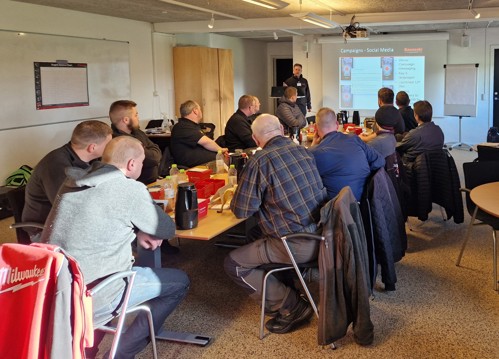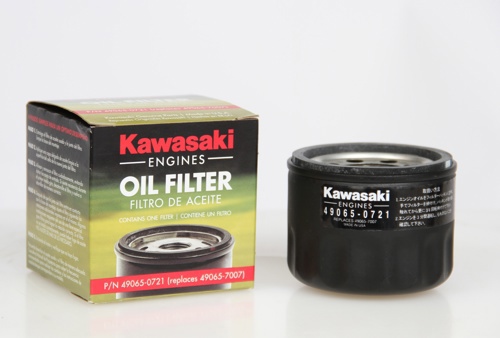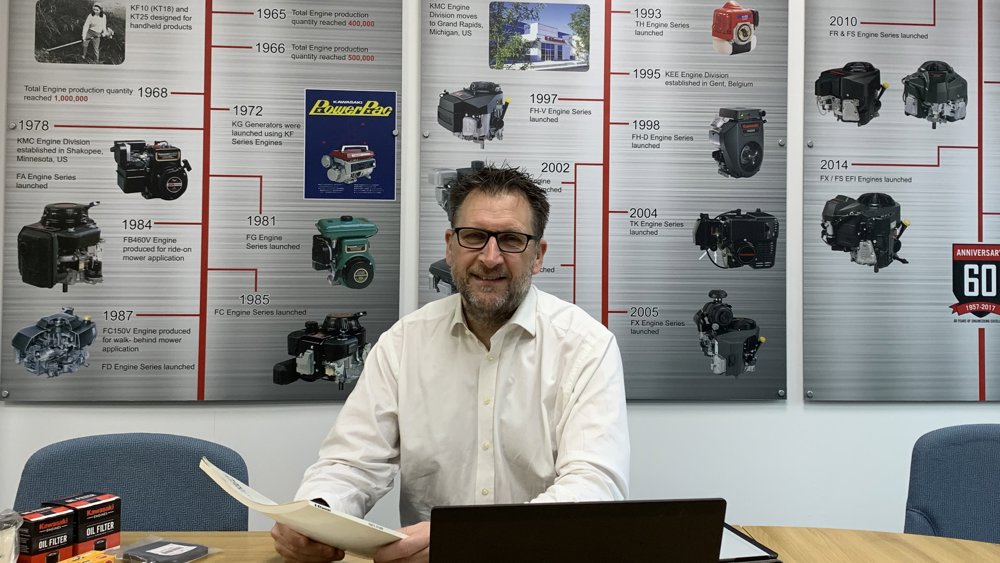It’s the middle of grass cutting season, business is excellent and you’ve been working non-stop, putting your equipment through its paces – then there’s an issue with your mower, or a part needs replacing. You need to know there’s local, expert support available to resolve it quickly and efficiently – and most importantly, get you back to work.
A reliable dealer network is essential, and at Kawasaki Engines, a lot goes on behind the scenes to make ours dependable. Jon Couling, our parts and technical manager, is responsible for providing training and support to the wide network of dealers, distributors and OEMs that keep landscape professionals working year-round.
We spoke to Jon to discuss the support professionals can rely on, how landscapers can find out more technical information about their engines and the benefits of purchasing genuine parts.
Kawasaki Engines has a wide network of dealers and distributors supporting landscapers across Europe. How do you help them do this?
For one, we offer excellent training and a thorough onboarding process to distributors so they get a clear understanding of the engines and parts they’re selling. This knowledge is then passed on by the distributors to dealers.
We help with all the usual processes to get them set up, and show them how to do all the basics, like ordering parts – but whatever you do to prepare, there can always be slight niggles on day one. We’re there to make sure start-up is smooth; we book meetings for the first day, with follow-ups over the next few weeks. Our distributors and dealers know the door is always open if they need any support from us.
Usually, everything works efficiently and correctly from day one, with continued training from then on, so landscapers know that the dealer or distributor they visit are the experts. If there are any issues, by having training and follow-up meetings booked, we ensure any issues are caught early and resolved immediately. At the end of the day, it’s all about delivering the best customer experience.
We also help with being transparent about promotions, sourcing specialist parts, anything that we can do – all the support we offer dealers and distributors has a knock-on effect of improving the support they can offer landscapers.
How do you keep them up to date on the latest technology? Could you tell me about the support and training you offer?
We host training sessions for distributors, and they pass on their learnings to their dealer network. A recent one we had was centred around EFI technology. We have just returned from Denmark where we assisted the distributor to train a number of their dealers with a course tailored to their specific requirements. We wanted to give the distributors a better understanding of the technology, and the diagnostic tool that’s available for EFI engines.
Our training helped them get a better technical understanding of our EFI engines, which gives them a knowledge base they can lean on when advising landscapers.

Is there any information available for landscapers looking to learn more about engines and parts?
There’s lots of great info on our website. Besides the usual, like owners manuals and specification sheets, which you can find on our Technical Downloads page, there are several articles that make the information a bit more accessible.
If you want to learn what the difference is between genuine parts and aftermarket, and what it could mean for your engine in real terms, you can learn all about it in a quick, easy-to-understand article. You can even try to spot the difference between the parts yourself. There’s advice on maintenance, increasing engine longevity – really, anything you need can be found on the website.
We want landscape professionals to get the best possible performance and longevity from their engine, so we offer advice on how to do that. Whether you’re looking for the official advice on preparation for winter storage or a guide to 4-stroke maintenance, there’s plenty of information available on our website.
What would you say to someone questioning if genuine parts are worth it?
I would say that any initial cost saving you have from choosing aftermarket parts is quite minimal compared to the hidden costs that can arise by taking the non-genuine route. Genuine parts are made to maximise performance and increase engine longevity – they are designed to be the highest quality part matched to the exact specification of your engine, and tested thoroughly.
The genuine Kawasaki air filters, for example, have a lower micron rating and more folds than aftermarket parts we’ve tested, so the filtration is superior. Poor filtration is one of those issues that doesn’t show immediately, but will, over time, degrade your engine – impacting performance and shortening its lifespan. Of course, in the worst case scenario, using an aftermarket part can lead to engine failure – and in this situation, if the aftermarket part is proven to be the cause, warranty is voided – so you really have to question if it’s worth the risk.
As I’ve just mentioned, we have a great article showing these differences – it’s never clearer than when you physically cut an oil filter in half and see how it’s designed for superior oil flow!
Ultimately, if you look after your engine, service at the recommended intervals and use genuine parts it will give you years of service.

How do you make sure parts are available to customers?
In an ideal world, everyone would stock mass amounts of everything. Of course it doesn’t work quite like that; you never want to be in the situation of having too little stock, leaving people waiting for parts and hurting their business, but there isn’t endless space to hold stock, and it isn’t a particularly sustainable approach either.
We’re careful to manage our stock levels to adjust to the busiest times for customers. Our challenge, like anyone else’s in our line of work, is having the right parts on the right shelf for the right customer at the right time. We use a mixture of our personal experience and a system that gives us a prediction on requirements.
It’s trickier with new products where we don’t have the history, but we have to be clever in our approach, and quick to react to additional demand. Human input combined with a more scientific approach is how we maintain good coverage – it’s a constantly evolving process to try and get it as close to perfect as we can.
Is there anything you do to get a better deal on parts for customers?
We want customers to receive the best value parts so we do everything we can while keeping quality as our priority. I’m working on streamlining supply for highly competitive parts, like spark plugs, for instance, to get the right volume from the right supplier, so we can get the best price possible for the market.
There’s a benchmark on price we look at, to make sure everything is in line with the market. No manufacturer will ever take on aftermarket pricing and they can’t – it’s not the objective, we won’t sacrifice quality for the sake of price. We try to get the best deals on parts for customers where possible, but increasing performance and longevity are our core aims.
Warranty claims are part of your remit. In the instance that a warranty claim is necessary, how do you guarantee a smooth resolution for customers?
Well, the first thing I’m happy to mention is that we receive a very, very low number of warranty claims. If there is a manufacturing defect, we have a straightforward process to resolve it. When a claim comes in, we identify if it's a genuine manufacturing defect – if it is, the customer will quickly get refunded. I’m happy to say that our process is fairly straight forward; we ask for details of the failure and sometimes request evidence or images to help make an informed decision.
How important are good relationships to providing a quality service?
Strong relationships with distributors and dealers, and helping them speed up their processes, ultimately helps customers. There’s a knock-on effect – if we provide excellent support to them, they can provide it in turn.
We have long-standing relationships with OEMs and distributors that allow us to work closely, providing a better service to the professionals that use their machines. Communication is key to maintaining these relationships; we want to always be available if they need a conversation, and provide that higher level of service. We want to be the supplier who is easy to deal with and makes their life as easy as possible.
Are there any innovations or initiatives you're hoping to implement?
I am working on a number of projects to simplify the way our distributors work with us, and to give a better service. For example, we’re developing the training we provide to our distributors, so that they can in turn roll out improved training to their dealers. We want to give the best support we can.
We’re always looking at ways to improve the professional’s experience, either through changes to our processes or technological innovations – it’s an ongoing ambition at Kawasaki Engines.
Thank you for sharing your insights Jon! For genuine parts and expert servicing that will maximise your engine performance and ensure its longevity, find a Kawasaki Authorised Dealer near you.
You may be interested in
-
Congratulations to Richard Willis, our latest brushcutter prize winner!

-
How will environmental legislation like ULEZ affect landscapers?

-
Help us shape our support for professional landscapers – take our survey today!

-
Powered by Kawasaki: Introduction to Husqvarna

-
Kawasaki Engines Christmas Quiz

-
Iwan Jones joins the ranks of Kawasaki prizewinners winning a brand new multi-tool








